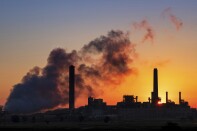This story is free to read because readers choose to support LAist. If you find value in independent local reporting, make a donation to power our newsroom today.
Climate change is drastically changing life for Indigenous peoples in the Pacific

A new report from the United Nations found that the southwest Pacific region faced more extreme drought and rainfall than average last year and dozens of disasters, including two cyclones in Vanuatu. The report underscores long-held concerns about how climate change is drastically changing life for Indigenous peoples of the Pacific.
This story was originally published by Grist. Sign up for Grist’s weekly newsletter here.
Grist is a nonprofit, independent media organization dedicated to telling stories of climate solutions and a just future.
“The world has much to learn from the Pacific and the world must also step up to support your initiatives,” U.N. Secretary General António Guterres said in Nuku’alofa, Tonga, last week at the Pacific Island Forum. His address coincided with the release of the report.
The Pacific Islands Forum is the premier diplomatic body for the region, representing both Pacific peoples who achieved independent statehood since World War II and territories that remain under Western rule.
“When governments sign new oil and gas licenses, they are signing away our future,” Guterres added.
What kind of problems are people experiencing?
The report said 2023 was one of the top three hottest years on record for the southwest Pacific region. Higher temperatures wrought a severe, six-month marine heat wave off the coast of Aotearoa, also known as New Zealand, while the two cyclones that hit Vanuatu in 2023 damaged more than 19,000 homes and disrupted health care services for an estimated 185,000 people.
The report’s findings resonate with Brianna Fruea, a 26-year-old musician and climate activist from Samoa. She’s part of Pacific Climate Warriors, an organization dedicated to advocating for climate action, and traces her ancestry not only to Samoa but also Tuvalu.
“It’s almost like we need Western science to validate what our people have already been saying just for the world to hear us,” she said.
Fruea is living in Aotearoa now, but when she last visited home in Samoa, she realized it had become so hot that there was a pause in rugby. “They weren’t allowing kids to play in the field because kids were passing out,” she said, adding that pausing the sport in the past would’ve been unheard of.
Cultural disruption is an issue
But climate effects aren’t limited to contemporary culture. In Fruea’s ancestral home of Tuvalu and on other islands like the Marshall Islands, communities are grappling with the cultural disruption of considering migrating entire villages within their nations. Existing social structures like chief designations are often based on geography and the makeup of villages and internal migration has the potential to upend those traditional social structures.
“If one village ceases to exist and they have to go and merge into another village, who then becomes the chief? Do they lose that complete structure?” Fruea said, adding that even within Samoa, every village has different rules and regulations, and that merging two of them would be challenging culturally.
The report said that the amount of annual climate financing in the Pacific region has been growing, but the vast majority — 86 percent — is through project-based interventions like strengthening coastal infrastructure in Tuvalu, while direct budget support represents just 1 percent. Both Guterres and Fruea highlighted the need for more funding as a pressing concern.
“It’s really important because the Pacific experiences the climate crisis intensely,” Fruea said. “With the trajectory we’re at with climate change, we have to think about the unthinkable.”










